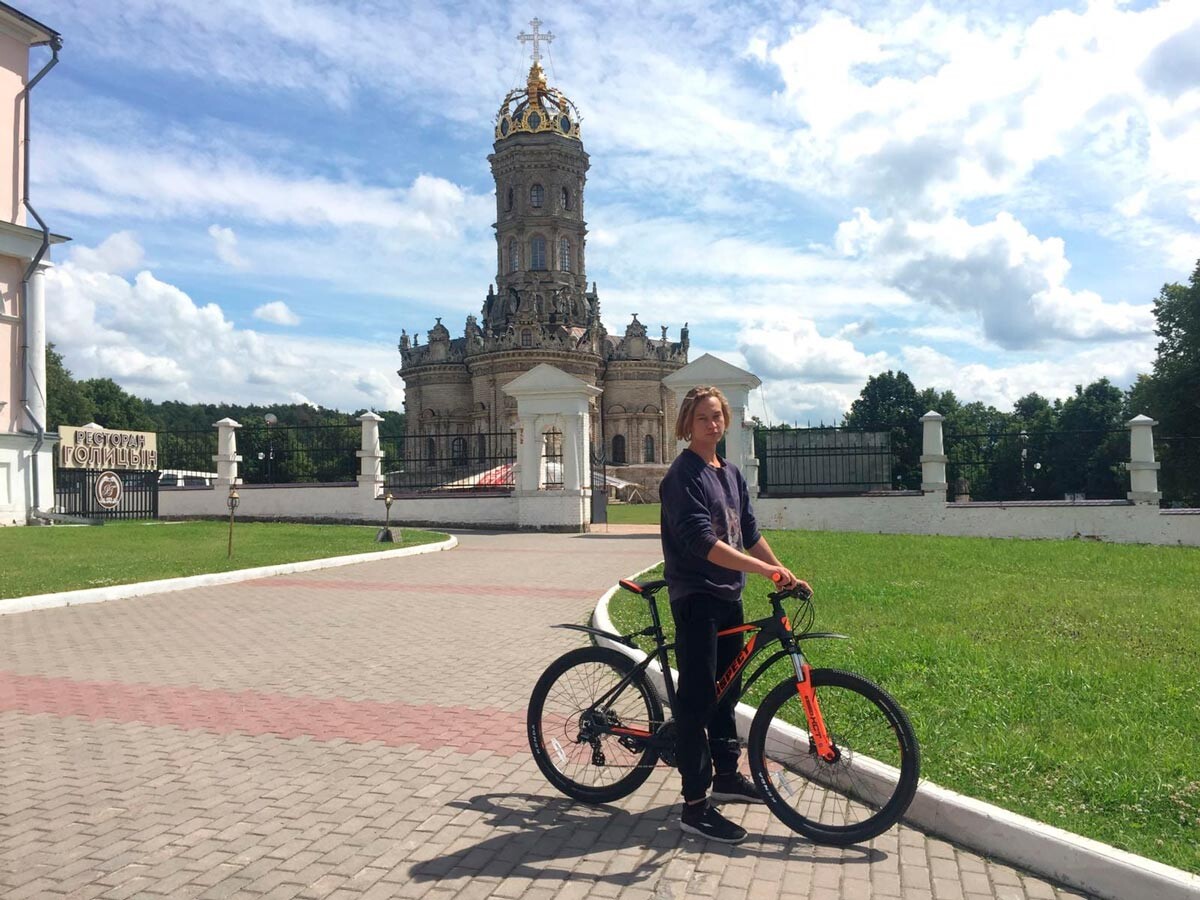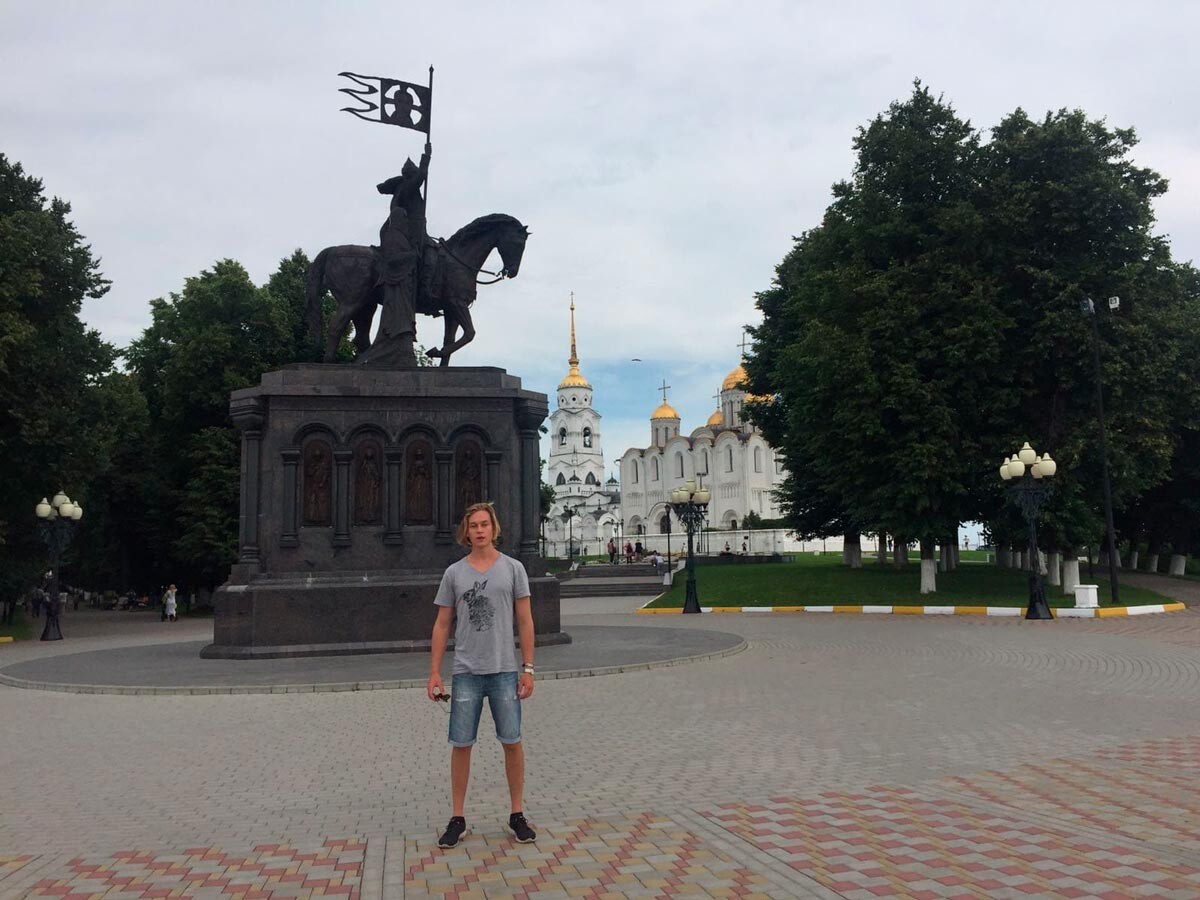
It was 2016 and I had been learning Russian for a couple of months. Together with my girlfriend, we were sitting in a cafe in Crimea having lunch. While eating, a middle aged man came up to me and said:
Это очень хорошо что ты учишь русский - it’s very good that you’re learning Russian.
I said: Спасибо, а почему? - thanks, but why?
He said with a smile and a wink: Потому, что скоро вся Европа будет говорить по-русски! - because soon the whole of Europe will be speaking Russian!
Oh, those Russian jokes!

Arie at the Moscow State University
Personal archiveI never expected to be speaking Russian. But everything changed after I met a Russian girl at university. We started dating and, after a couple of months, she asked me if I would want to travel to Russia for two weeks in summer to see her parents.
We traveled to Moscow, St. Petersburg, Tver and Crimea. And here were some of my first impressions:

A bike tour in the Moscow Region
Personal archiveNeedless to say, my first time in Russia wasn’t the last time. My girlfriend and I are still together. We live in the Netherlands. But, we still travel about twice per year to Russia. During that time, I haven’t stopped learning Russian. So, by now, I think I know a thing or two about the language.
Many people that want to learn Russian complain about how difficult the language is. Now, this is understandable, as you’ve got six difficult cases, verbs of motion and a new (Cyrillic) alphabet.

Arie in the city of Vladimir
Personal archiveBut, in my experience, Russian isn’t that difficult to learn. Because there are many aspects of Russian that make the language easier to learn. For example:
The lack of articles: If you’ve ever tried learning a language such as French or German, you know how insidiously difficult it can be to remember all the little articles. There are no obvious rules whether it’s ‘le’ or ‘la’ in French, and you have to remember an extra useless word for each noun that you learn.
But what about Russian? Russian does not have any articles. And this means that you cannot make any mistakes here. This helps foreigners a lot when they want to sound like a native spweaker.
Flexible word order: Russian uses cases to show the function of each noun in a sentence. This means that you don’t need a strict word order (such as in most Germanic or Latin languages), to make a coherent sentence.

Arie at the Baikal
Personal archiveThis is great for Russian students, as it frees up a lot of brainpower. You can start speaking a sentence with the first word that comes to your mind. And while you’re pronouncing the first word, think of the second word. When learning other languages, you need to form a complete sentence before opening your mouth. This makes your speech sound a lot more fluent and dynamic when you try to speak Russian.
You MUST speak Russian in Russia: Since the level of English isn’t that high in Russia, you’re basically forced to learn Russian, if you plan on spending significant time in Russia. This may sound harsh, but it’s a benefit in disguise.
In the Netherlands, where I’m from, we speak English well. That means that foreigners who live there do not have a need to learn Dutch. So, unfortunately, many end up not speaking Dutch, even after having lived in the country for years.
With Russian, it’s the opposite. It’s impossible not to speak Russian if you spend years (or just months) in Russia.

On the Red Square
Personal archiveIf you’re thinking of learning Russian, I recommend you give it a try. Like I mentioned above, it’s not as difficult as it seems. And there are plenty of benefits that you get when learning Russian:

Arie in St. Petersburg
Personal archiveEven though Russian is not as difficult as many believe, it’s not easy. While you may be able to have basic conversations after several weeks or months of learning, becoming fluent in Russian is something that will take years.
Here’s my advice if you’re aiming for Russian fluency:

Fake police car
Personal archiveWhile in Russia, I got a lot of compliments that my Russian didn’t sound bad for a foreigner. So, when I came home I decided to start a website where I help other foreigners to learn Russian. Later, as part of that project, I uploaded a video where I spoke Russian to YouTube to practice my own Russian.
But, after a couple of months, the YouTube algorithm started showing these practice videos to Russian people. And suddenly, there were thousands of Russians watching them. Now, several years later, I have more than 100,000 subscribers watching me speak Russian, which is something I never expected.
Here is the most watched video, in which I speak about 11 things that surprised me as a foreigner in Russia, enjoy:
If using any of Russia Beyond's content, partly or in full, always provide an active hyperlink to the original material.
Subscribe
to our newsletter!
Get the week's best stories straight to your inbox